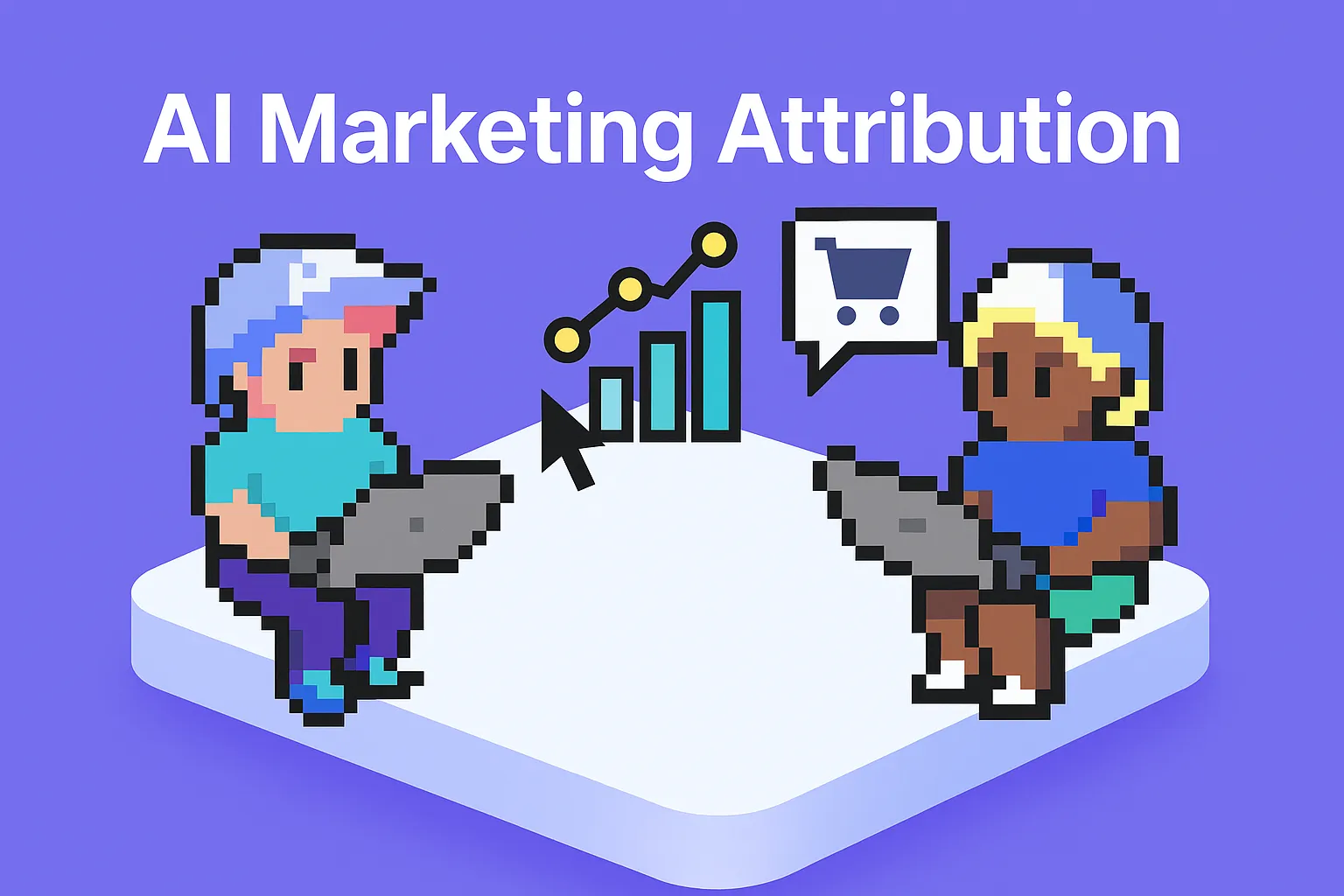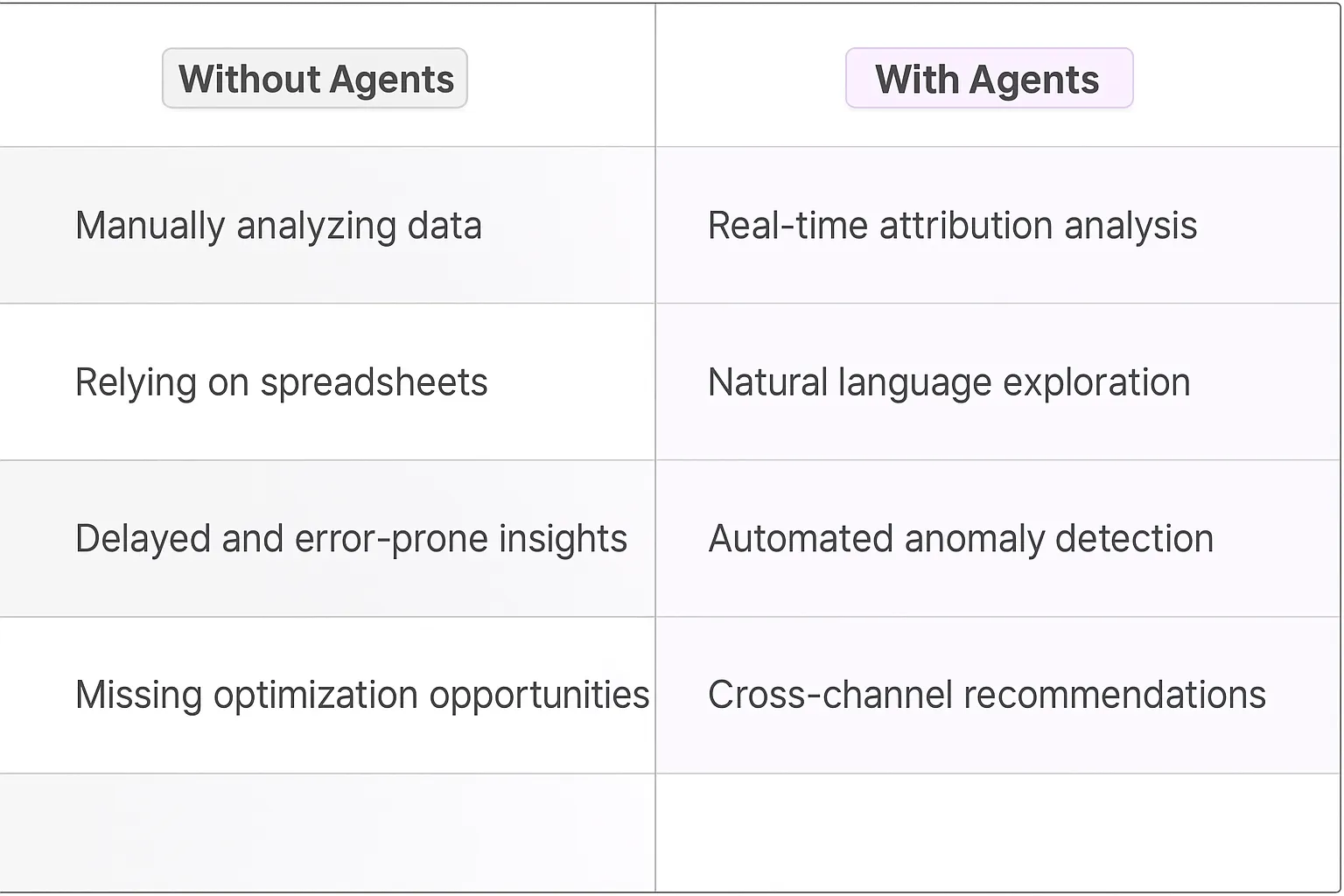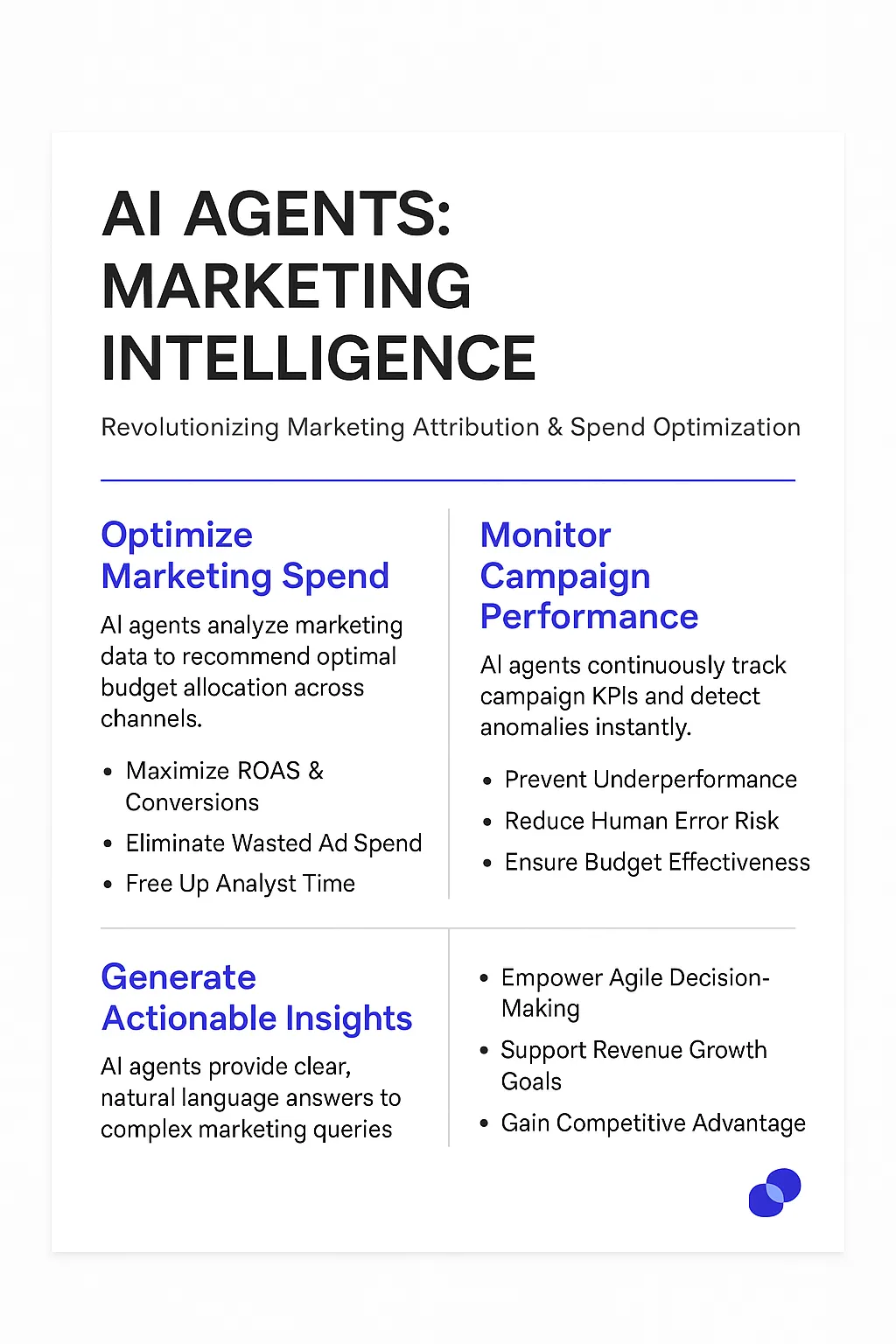Rockerbox
Understanding Rockerbox's AI-Powered Marketing Attribution
Rockerbox stands out as a marketing attribution platform that leverages AI technology to decode complex customer journeys. The platform processes vast amounts of cross-channel data to determine which marketing efforts truly drive conversions. Unlike traditional attribution tools, Rockerbox employs sophisticated AI agents to analyze customer behavior patterns and provide granular insights into marketing performance.
Key Features of Rockerbox
- Multi-touch attribution modeling powered by machine learning
- Real-time data analysis and analysis capabilities
- Cross-device tracking and journey mapping
- Natural language interface for data exploration
- Automated anomaly detection and alerting
- Custom report generation through AI-driven insights
- Integration with major marketing platforms and analytics tools

Benefits of AI Agents for Rockerbox
What would have been used before AI Agents?
Marketing teams traditionally relied on complex spreadsheets, manual data analysis, and multiple team members to piece together attribution insights. They spent countless hours correlating customer touchpoints, analyzing conversion paths, and building attribution models from scratch. The process was not only time-intensive but prone to human error and inconsistencies in data interpretation.
What are the benefits of AI Agents?
AI Agents transform how marketing teams interact with Rockerbox's attribution platform through several key advantages:
- Real-time attribution insights: Digital teammates analyze vast amounts of customer journey data instantly, spotting patterns and correlations that would take human analysts days or weeks to uncover.
- Natural language data exploration: Instead of wrestling with complex queries or dashboard configurations, teams can simply ask questions about their attribution data in plain English and receive clear, actionable insights.
- Automated anomaly detection: AI Agents continuously monitor attribution patterns and alert teams to significant changes or unusual trends that warrant attention, eliminating the need for constant manual monitoring.
- Cross-channel optimization: By processing data analysis from multiple marketing channels simultaneously, AI Agents provide recommendations for budget allocation and campaign adjustments based on real-time performance metrics.
- Custom reporting automation: Teams can generate sophisticated attribution modeling reports through simple conversations with their digital teammates, saving hours of manual report building while ensuring consistency in analysis methodology.
The network effects are particularly powerful here - as more marketing teams interact with these AI Agents, the systems become increasingly adept at understanding industry-specific terminology and common attribution scenarios, creating a flywheel of improving capabilities and insights.

Potential Use Cases of AI Agents with Rockerbox
Marketing Attribution Analysis
Marketing teams can deploy AI agents to continuously analyze attribution data across multiple channels. The agent monitors conversion paths, identifies which touchpoints drive the highest value customers, and surfaces actionable insights about the customer journey. This enables rapid optimization of marketing spend and campaign adjustments based on real performance data.
Customer Journey Mapping
AI agents excel at processing the massive datasets needed to map complex customer journey mapping. They can identify patterns in how customers interact with different marketing channels, spot conversion bottlenecks, and highlight opportunities to improve the path to purchase. The agent provides ongoing analysis of journey changes as new campaigns launch.
Budget Allocation Optimization
By analyzing historical performance data, AI agents can recommend optimal budget allocation across marketing channels. The agent evaluates ROAS, CAC, and other key metrics to suggest data-driven spending adjustments. This moves teams beyond gut-feel decisions to precise, performance-based budget optimization.
Campaign Performance Monitoring
AI agents provide always-on monitoring of campaign performance monitoring, spotting performance changes and anomalies in real-time. When metrics deviate from expected ranges, the agent alerts the team and suggests potential causes and solutions. This enables rapid response to both opportunities and issues.
Competitive Intelligence
The agent can track competitor marketing activities across channels, identifying shifts in strategy and new campaign launches. This automated monitoring helps teams stay ahead of market changes and adapt their own tactics accordingly. The agent surfaces relevant competitive insights without requiring manual research.
Custom Report Generation
Rather than spending hours manually creating reports, teams can have AI agents automatically generate custom attribution and performance reports. The agent pulls relevant data, creates visualizations, and highlights key insights - delivering polished reports ready for stakeholder review.
Cross-Channel Analysis
AI agents excel at analyzing how different marketing channels interact and influence each other. The agent can identify channel synergies, attribute proper credit for conversions, and recommend ways to optimize cross-channel campaigns for maximum impact.
These use cases demonstrate how AI agents transform marketing attribution from a periodic reporting exercise into an ongoing optimization engine. The agent becomes an integral part of the marketing team, continuously surfacing insights that drive better decisions.

Industry Use Cases
Marketing attribution has always been a complex puzzle, but Rockerbox AI agents are transforming how businesses connect the dots between customer touchpoints and conversions. These digital teammates integrate seamlessly into marketing operations across multiple sectors, each bringing its own unique analytical capabilities to the table.
The real power lies in how these AI agents adapt to different business models and marketing strategies. From D2C brands tracking multi-channel campaigns to B2B companies mapping extended sales cycles, the applications are as diverse as the industries themselves. What makes this particularly interesting is how the AI learns and evolves with each interaction, building increasingly sophisticated attribution models that reflect real-world customer journeys.
Looking at specific industry implementations, we're seeing patterns emerge that highlight where these AI agents create the most value. The following examples demonstrate how different sectors leverage Rockerbox's AI capabilities to solve their unique attribution challenges and uncover previously hidden marketing attribution insights.
E-commerce Growth Optimization with Rockerbox AI
Digital-first retailers face a complex puzzle in understanding which marketing channels truly drive sales. The traditional attribution models often miss crucial touchpoints in the customer journey, especially with privacy changes limiting tracking capabilities. A Rockerbox AI digital teammate transforms this landscape by processing vast amounts of marketing data to reveal hidden patterns in customer behavior.
Take an online fashion retailer running campaigns across Instagram, Google Ads, and email marketing. The AI analyzes historical purchase data, identifying that customers who engage with Instagram story ads within 24 hours of receiving an abandoned cart email are 3.2x more likely to complete their purchase. This granular insight enables precise budget allocation and timing of marketing messages.
The AI's pattern recognition capabilities extend beyond basic correlation. It can detect subtle signals - like the impact of weather patterns on conversion rates for seasonal clothing, or how newsletter engagement on mobile devices influences desktop purchases later in the day. These micro-insights add up to significant improvements in marketing ROI.
Most importantly, the AI continuously adapts its attribution models based on real-time data. When iOS updates affect tracking capabilities, or when new social commerce features emerge, the system automatically adjusts its analysis to maintain accuracy. This dynamic approach ensures e-commerce brands stay ahead of market changes while optimizing their marketing spend with precision.
The result? E-commerce brands using Rockerbox AI typically see a 40% reduction in customer acquisition costs within the first quarter, while maintaining or increasing their conversion rates. The AI doesn't just track attribution - it provides actionable insights that drive measurable business growth.
Travel Industry Marketing Attribution with Rockerbox AI
The travel industry's marketing attribution challenge stems from incredibly long customer decision cycles - often 3-6 months from initial research to booking. Traditional attribution models break down when trying to connect early-funnel content engagement to final conversions. Rockerbox's AI digital teammate excels at uncovering these extended customer journeys.
A luxury cruise line implemented Rockerbox AI to decode their complex marketing mix. The AI discovered that blog readers who spent over 4 minutes on destination guides were 5x more likely to book a cruise within 120 days - but only if they later saw retargeting ads featuring the specific destinations they researched. This insight led to a complete restructuring of their content and paid media strategy.
The AI's deep learning capabilities identified seasonal booking patterns that went beyond obvious holiday correlations. For example, it found that adventure travel packages saw higher conversion rates when Facebook ads were shown to mobile users during their Monday morning commute times, while luxury resort packages performed better when targeted to desktop users during evening hours.
Cross-device tracking revealed that 78% of travelers switched between three or more devices during their booking journey. The AI mapped these complex paths, showing that users who started research on mobile but completed bookings on desktop had a 2.3x higher average order value. This insight drove the development of device-specific content strategies.
Travel companies using Rockerbox AI reported a 52% improvement in marketing spend efficiency and a 31% increase in booking values. The system's ability to connect early research phases to final conversions transformed how travel marketers allocate their budgets across the extended customer journey.
Considerations and Challenges
Implementing Rockerbox AI agents requires careful planning and strategic consideration across multiple dimensions. The complexity extends beyond simple deployment into areas of data governance, team dynamics, and technical infrastructure.
Technical Challenges
Data integration poses the first major hurdle when deploying Rockerbox AI agents. Marketing attribution data often lives in fragmented systems, requiring robust ETL processes to consolidate and normalize information. Teams need to establish reliable data integration pipelines while maintaining data quality and freshness.
API rate limits and data volume management become critical factors as attribution tracking scales. Organizations must implement intelligent caching and queuing mechanisms to handle peak traffic periods without degrading performance or losing valuable attribution data.
Operational Challenges
Cross-functional alignment proves essential yet challenging when implementing Rockerbox AI agents. Marketing teams need to collaborate closely with analytics and engineering teams to define attribution models and establish measurement frameworks. This requires clear communication channels and shared understanding of business objectives.
Change management deserves significant attention during implementation. Teams accustomed to traditional attribution methods may resist new AI-driven approaches. Creating detailed documentation, providing hands-on training, and demonstrating early wins helps drive adoption.
Data Quality Considerations
Attribution accuracy depends heavily on data quality. Teams must establish rigorous validation processes to identify and correct data anomalies. This includes implementing checks for duplicate events, proper channel tagging, and consistent UTM parameter usage.
Privacy compliance adds another layer of complexity. With evolving regulations like GDPR and CCPA, organizations need robust systems to manage user consent and ensure compliant data collection across all attribution touchpoints.
Resource Planning
Successful implementation requires dedicated resources beyond initial setup. Organizations should allocate budget for ongoing maintenance, model refinement, and system optimization. Regular audits and updates ensure the attribution system evolves with changing business needs.
Building internal expertise becomes crucial for long-term success. Teams need specialists who understand both marketing attribution principles and AI capabilities to maximize the value of Rockerbox agents.
AI-Driven Marketing Attribution: Shaping the Future of Campaign Optimization
The integration of AI agents with Rockerbox's attribution platform marks a fundamental shift in how marketing teams understand and optimize their campaigns. These digital teammates eliminate the guesswork from marketing attribution, providing clear, actionable insights that drive measurable results. As AI technology continues to evolve, the platform's capabilities will only grow stronger, offering even deeper insights into customer behavior and marketing performance. Organizations that embrace this technology now position themselves at the forefront of data-driven marketing, ready to adapt and thrive in an increasingly complex digital landscape.













